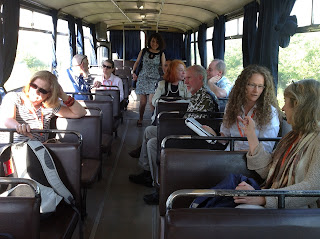Deniz moved on to discuss her research, carried out with 100 teachers. Teachers were asked which people positively affect their motivation in the work place. The most common response was students, followed by friends in the work place and then colleagues.
When asked to describe their professional development with a metaphor. Metaphors used included climbing mountains, journey, boat, owl, cliff, orchestra, roots, and a volcano.
Teachers were next asked for their perceptions of the overall effectiveness of certain factors in their current work place. Language teaching methodology topped the list, with technology supported teaching and learning a close second. For factors which received low ratings, teachers were asked to give suggestions on what could be done. Some suggestions for fostering teacher motivation included:
- Higher salaries
- More preparation time
- Appreciation - thank you notes
- More interaction between admin and teachers
- Increasing ownership
What can we do to increase motivation around us? Some suggestions from Deniz:
- Don't see apologising as a weakness
- When you say thank you really mean it
- Don't expect everything to be crystal clear, embrace the challenge to find out
- Don't dwell on petty little details - look at the bigger picture
- Be fair, be just
- Be careful of the Matthew effect - people who have more advantages get more in time, those with less opportunities get even less opportunities in time.
- Personal development is important or professional development will not take place.
And finally Deniz suggested that it's important to have some social time for teachers within working hours. Activities carried out Sabanci University include tarot reading, massages, henna, facial masks .... with wine and cookies. :)
Coffee time :)
Suzan Oniz kept the audience entertained during her workshop on free online corpora for collocation teaching. She categorised collocations as:
Strong collocations - one word is decisive and makes the difference e.g. vent you anger, harbour a grudge, call off a wedding / match (but you can't call off a class).
Weak collocations - go with everything and generally work across language e.g. long journey, good idea
Medium - strong collocations are problematic e.g. break off, over hear
Why are collocations important for foreign language learners? Suzan explained that collocations:
- Enrich word treasury
- Increase fluency & quick production of language
- Reduce grammar mistakes
Some suggestions for teaching collocations include:
- Grouping words
- Corpus analysis - find collocations, work out patterns, create exercises by manipulating the data
- Fly swatter activity
- Pairing / matching activities
- Using the Compleat Lexical tutor
Thank you for the practical ideas Suzan!
The conference ended with a raffle and cocktail :)
Thank you to the organisers and all the participants for making it a truly memorable occasion :)






















